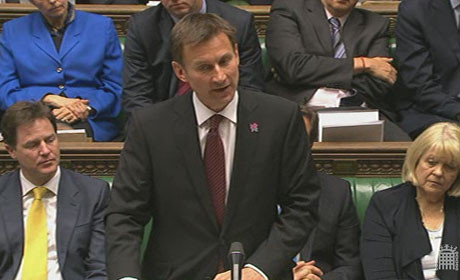
Hunt told Parliament earlier this week that the 'idea I was backing the BSkyB bid is laughable'
Credit: Image from Parliament TVCulture secretary Jeremy Hunt has told the BBC he will be giving the Leveson inquiry a copy of "private texts and emails" sent to his special advisor, in a bid to show he "handled the BSkyB merger process with total integrity"
The BBC reported today that Hunt told journalists he would be handing over the messages, after the Leveson inquiry heard from former News International chairman James Murdoch that News Corporation was "receiving feedback and information" relating to its bid for BSkyB from the culture secretary's office, including via his special advisor Adam Smith.
A DCMS spokesperson added "we will publish all relevant information to the Leveson inquiry".
Smith has since stepped down as Hunt's special adviser, issuing a statement to say that "while it was part of my role to keep News Corporation informed throughout the BSkyB bid process, the content and extent of my contact was done without authorisation from the secretary of state".
He added that his "activities at times went too far and have, taken together, created the perception that News Corporation had too close a relationship with the department, contrary to the clear requirements set out by Jeremy Hunt and the permanent secretary that this needed to be a fair and scrupulous process."
Hunt, who has rejected calls from the opposition for his resignation and told Parliament the "idea I was backing the BSkyB bid is laughable", called for his own appearance at the Leveson inquiry to be brought forward in response to the allegations relating to the contact between his office and News Corporation during the BSkyB bid.
In a statement Hunt added that "some of the evidence reported meetings and conversations that simply didn't happen".
Murdoch told the inquiry earlier this week that he took the communications from Hunt's office "with a grain of salt".
"Most of these emails are about the process and concern that appropriate things are being considered and legal arguments were heard around the place.
"This is a large scale transaction that was in the hands, with respect to decision making process, of DCMS, and it was entirely reasonable to try and communicate with the relevant policy makers about the merits of what we were proposing."
On BBC Question Time last night Simon Hughes, deputy leader of the Liberal Democrats, said what he "cannot understand is why the matter of the ministerial code of conduct, which is to do with do you take responsibility for your special advisor ... is not something the Prime Minister immediately should refer to the person who's been given the job to do it, Sir Alex Allan. Only the Prime Minister can do that, he has so far resisted to do it."
Free daily newsletter
If you like our news and feature articles, you can sign up to receive our free daily (Mon-Fri) email newsletter (mobile friendly).











